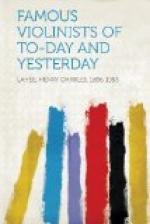Spohr remained at Gotha until 1813, when he was offered and accepted the post of the leadership at the Theatre an der Wien at Vienna, and while here he composed his opera of “Faust,” which, however, was not produced at that time. He also wrote a cantata in celebration of the battle of Leipzig, which he did not succeed in producing, and not feeling satisfied with his position, and having various disagreements with the management, the engagement was cancelled by mutual consent. During his stay in Vienna Spohr was frequently in contact with Beethoven, and though he admired that great master he criticised some of his compositions very severely, and is said to have remarked that “Beethoven was wanting in aesthetic culture and sense of beauty,” a remark difficult to understand in these later days. It is the more incomprehensible from the fact that Spohr in after years was the very first musician of eminence to interest himself in Wagner’s talent, for he brought out at Cassel “Der Fliegende Hollaender,” and continued with “Tannhaeuser,” notwithstanding the opposition of the court. He considered Wagner to be by far the greatest of all dramatic composers living at that time. In 1815 he made a concert tour in France and Italy, during which he met Rossini and Paganini, playing at Venice a sinfonia concertante of his own composition, with the latter.
On his return to Germany in 1817 Spohr was appointed conductor of the Opera at Frankfort-on-the-Main, where his opera “Faust” was now produced, also “Zemire and Azor.” Owing to difficulties with managers again he left Frankfort after a stay of only two years, and his next venture was a visit to England, where he appeared at the concerts of the Philharmonic Society in London. His success was brilliant, for his clear style and high artistic capacity, added to his reputation as a composer, carried him into popularity, and the artistic world vied with the public in doing honour to him. At his farewell concert, his wife made her last appearance as a harp player, for on account of ill-health she was obliged to give it up, and thereafter she played only the pianoforte.
On his way home from England Spohr visited Paris for the first time, and made the personal acquaintance of Kreutzer, Viotti, Habeneck, Cherubini, and other eminent musicians, who received him with the greatest cordiality. But the public did not seem to appreciate his merits, for his quiet, unpretentious style was not quite in keeping with the taste of the French.
On his return to Germany Spohr settled in Dresden, and remained there until 1822, when he became Hofkapellmeister to the Elector of Hesse-Cassel, and he remained in Cassel for the rest of his life. This position he obtained on the advice of Weber.
In 1831 he completed his great “Violin School,” which has ever since its publication been considered a standard work. The following year the political disturbances interfered with the opera performances at Cassel, and caused him much annoyance. In 1834 he lost his wife, but his work of composition proceeded with vigour.




